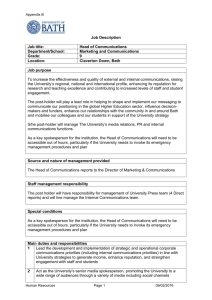crisis communication notes
advertisement
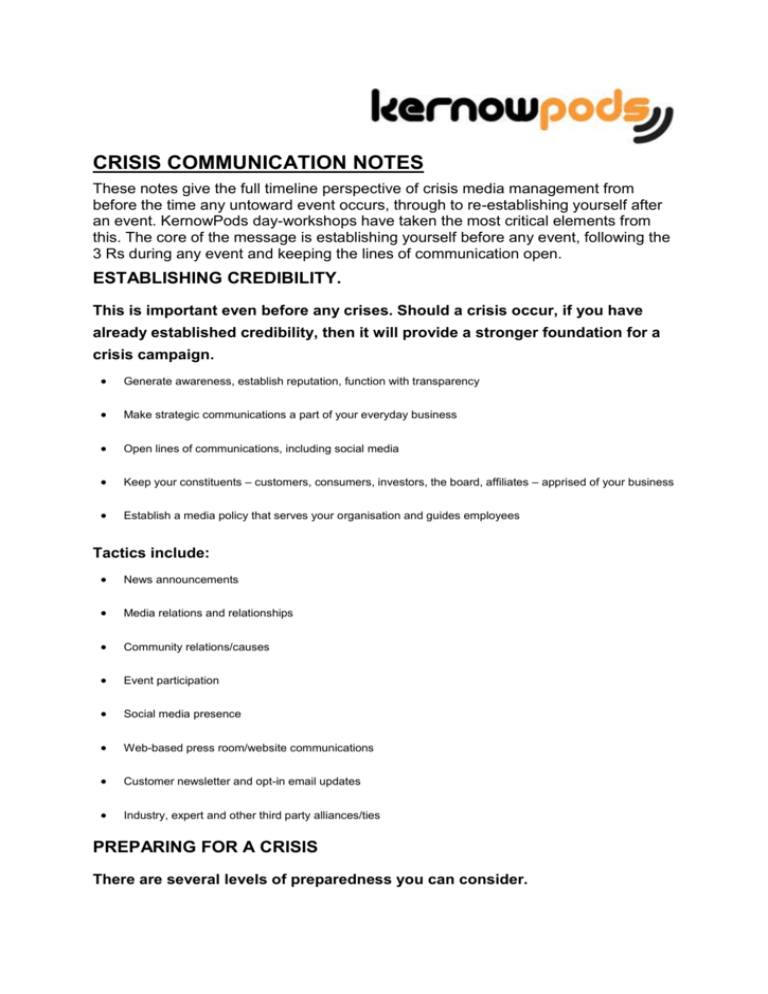
CRISIS COMMUNICATION NOTES These notes give the full timeline perspective of crisis media management from before the time any untoward event occurs, through to re-establishing yourself after an event. KernowPods day-workshops have taken the most critical elements from this. The core of the message is establishing yourself before any event, following the 3 Rs during any event and keeping the lines of communication open. ESTABLISHING CREDIBILITY. This is important even before any crises. Should a crisis occur, if you have already established credibility, then it will provide a stronger foundation for a crisis campaign. Generate awareness, establish reputation, function with transparency Make strategic communications a part of your everyday business Open lines of communications, including social media Keep your constituents – customers, consumers, investors, the board, affiliates – apprised of your business Establish a media policy that serves your organisation and guides employees Tactics include: News announcements Media relations and relationships Community relations/causes Event participation Social media presence Web-based press room/website communications Customer newsletter and opt-in email updates Industry, expert and other third party alliances/ties PREPARING FOR A CRISIS There are several levels of preparedness you can consider. Media Training will help you designate appropriate spokespeople, develop messaging, and prepare for press interviews. You would learn how to respond effectively. Communications Planning gives you the basic tools to create beneficial media opportunities, for example, getting out in front of an issue rather than functioning reactively. With communications planning, you establish a social media policy, a media policy, establish media visuals such as product shots and video, establish media monitoring, involve third-party experts, craft FAQs, and establish search engine optimisation practices. Disaster and Operational Planning is important for any organization, and is your strategy and set of tactics for dealing with contentious situations. This level of preparedness includes scenario planning, pre-drafted position statements, a message action plan for all audiences, plans for a hotline, prepared fact-gathering questions, relocation alternatives, a pre-formatted web page that can provide custom messages and information, and contact rosters. Role Play Drills are intensive exercises. They prepare you in a number of ways: Clarify roles and responsibilities, identify actions and enhance the decision-making process for implementation of industry guidelines in the event of a crisis. These exercises identify issues for management that guide further development of protocols, procedures, training and policy making. Role Play Drills are opportunities to review how to transition into an Emergency Organization as outlined in Emergency Response Plans in accordance with your Emergency Management System. Very quickly, roles and responsibilities are clarified. MANAGING A CRISIS. A simplified approach is the four Rs: Regret / Reason / Remedy / Recover. R – Regret “Our hearts go out to the families at this difficult time” “We feel sincerely for those affected…” “We understand that people are angry at this time and our thoughts are with them…” Do NOT say sorry. R – Reason “Initial investigations are inconclusive, however, we will be able to tell you more in 24 hours…” “We cannot give any further details why this happened because of a police investigation…” “It would be unfair on those affected to give an incomplete statement on what went wrong – however, we will be holding a press conference in 24 hours to update you on this…” R – Remedy “In the meantime, we are checking all our safety training…” “The people involved have been suspended until we know more about what went wrong…” “We are currently having all fire alarms checked independently to make sure all safety systems are working properly and that this does not happen again.” R – Recover Once you have got yourself out of the sticky patch – then you need to come up with a strategy to recover reputation. In more detail: Public welfare is first priority All bad news out at once/Assemble the facts No blame, no speculation, do not repeat the charges Tell your side of the story/Take responsibility Care and concern High-level organization spokesperson Ensure that it will not happen again Keep separate plan for moving ahead There are several basic “dos” when it comes to crisis communications: Provide information to the outside; update key personnel Establish organisation spokesperson; speak only on behalf of the organisation Keep checklists and key documents easily available Updated media lists Refer legal issues to lawyers, medical issues to doctors, investigative issues to appropriate authorities Stay calm; stay positive Show care, concern, empathy In a crisis situation, the “dont’s” are just as important: Avoid discussion of blame and liability (hence ‘regret’ in the three Rs) No unnecessary information Do not release names of injured until next of kin are notified Spokesperson does not go off message Do not speculate; do not estimate Do not permit press to wander unescorted; do not allow access when safety cannot be guaranteed Do not say “no comment” – always give a reason – or a reason you cannot give a reason (see the three Rs). Do not put anything in writing or emails that you wouldn’t want to see in the newspaper the next day Here are the best case procedures to implement in urgent, reputationthreatening situations: Effective alert system Strong online and offline strategy Keep Communications in the loop; frequent and regular updates Monitor, evaluate, respond Openly communicate with approved position statements at the ready Staff follows company media (including social media) policy. Remind staff about any legal responsibility on this case – including contractual responsibility. Call on third party expert alliances and relationships On the spot Scenario Planning for each new development Media trained spokesperson(s), continually test organisation messages Online and offline go-to resource for information at your fingertips Multi-channel communications for different audiences – this is about making your message appropriate for the particular audience. So BBC Radio Cornwall will use different language to Pirate FM and Westcountry News. Video and/or photos helping to tell your story Take the high road in tone; strive for “good guy” positioning Do not fall prey to “we can’t get a fair break” thinking, even when unjustly accused RECOVERING FROM A CRISIS. Managing your way through is not the end result or goal. Should you have a crisis situation, you need to recover from it with your reputation undamaged, your brand respected, and your relationships intact. Diligence in the reputation-rebuilding process is important to maintain because, depending on the nature and duration of the crisis, progress may be long-term. There are several tactics to take to ensure recovery from a crisis with your reputation, brand and business not just surviving, but thriving. Maintain open level of communication with media, community, customers, consumers, investors, governing bodies, affiliates Employ awareness tactics Differentiate your organisation from the pack Become a category expert amongst your peers Conduct “post mortem” analysis and incorporate what’s been learned in future crisis and scenario planning
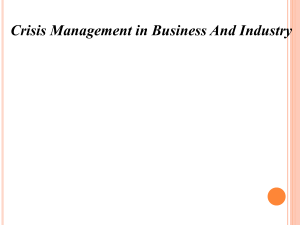


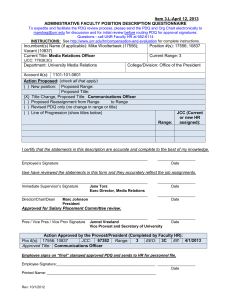
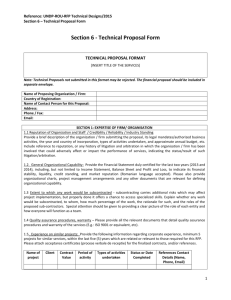
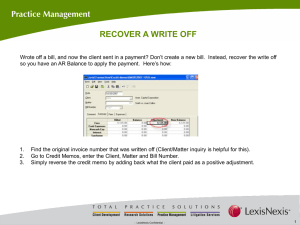

![Crisis Communication[1] - NorthSky Nonprofit Network](http://s2.studylib.net/store/data/005428035_1-f9c5506cadfb4c60d93c8edcbd9d55bf-300x300.png)
